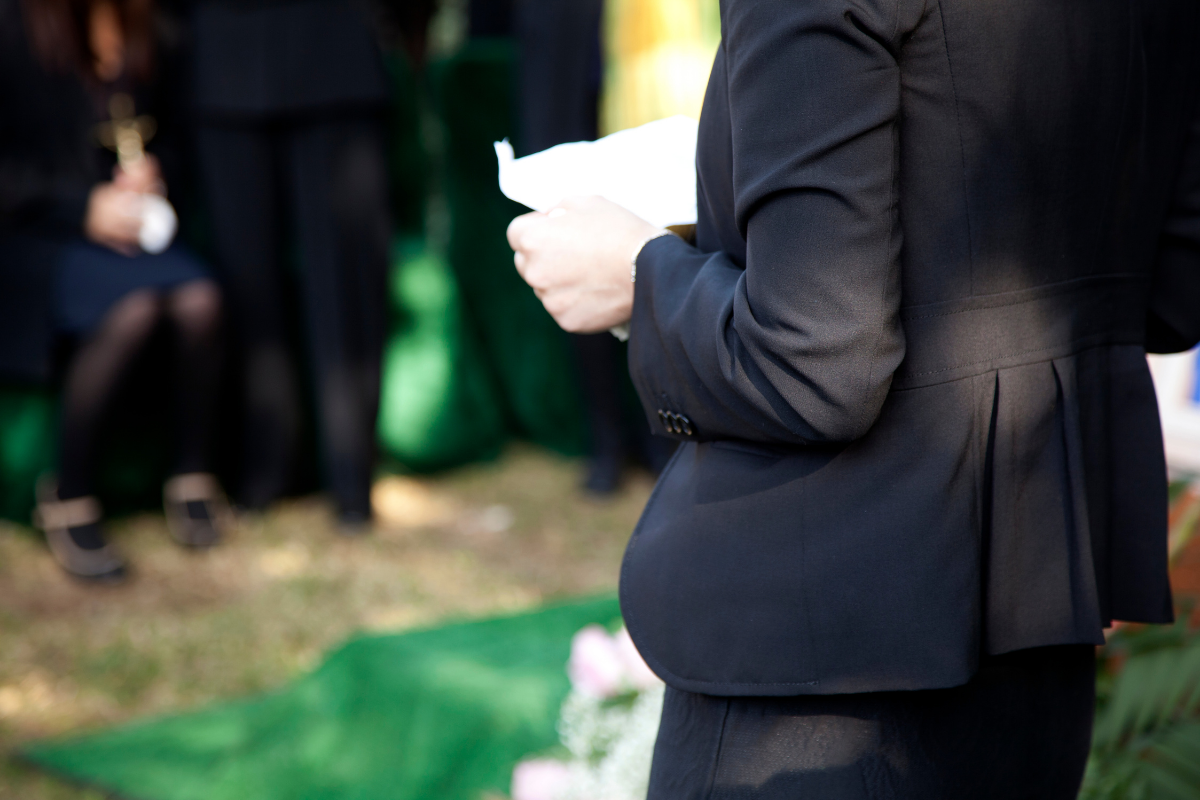Why You Should Write Your Own Eulogy (And What It Should Say)
They say two things are for certain in this life: death and taxes. Traditionally, when we die, friends, family, and / or clergy eulogize us. Usually, the final words said about the departed are positive ones that honor the life we led, the love we shared, and the accomplishments and events that mattered most to us. Unfortunately, many eulogies end up being generic word crap, which leaves friends and family even more distraught (assuming you were a decent person and they’re not just showing up to make sure you’ve really left the proverbial building). This is just one reason you should write your own eulogy.
1. You Should Write Your Own Eulogy Because Only You Knows Who & What Mattered Most to You
One of the most memorable episodes of Sex and the City was the one where Miranda and the girls attended her mother’s funeral. During the eulogy, the clergyman misspoke, identifying Miranda as someone’s spouse, not as her mother’s daughter. Afterward, Carrie, Miranda, and her friends called the man a hack and lamented how inept a person had to be to not even get the family straight.
Unfortunately, this kind of mistake isn’t uncommon. Despite having notes and information provided by the (grieving and distraught) family, eulogies are often non-personal and contain mistakes. If you’re over the age of 35, you’ve probably attended at least one funeral where the main point of conversation at the gathering after the service was the shoddy eulogy.
Thus, you should write your own eulogy because you know who and what mattered most to you, which means you’ll get your facts straight. I mean, who wants to be upstaged by the inaccuracy of the eulogy at their own funeral? (Don’t make me get up outta this casket now, generic bad eulogy.)
2. You Should Write Your Own Eulogy as a Final Gift to Those You Loved (Or Hated)
The other big reason to write your own eulogy is because it’s a final gift to those who you loved the most. This is the last time they’ll hear your “voice”, and if you’ve never had the experience of hearing new words from someone who will never speak to you again, I can assure you; it’s a gift.
My husband died fewer than three days after I was told he wouldn’t survive his cancer battle. The majority of that time, he was heavily sedated from pain and nausea medication, and there was no time for final words, something we all hope we have time for…final I love yous…advice on how to live without the person…. Shortly after he passed away, I found two long, beautiful love letters to me and to his daughters on his phone.
In those letters, we have a lifetime of love and guidance, of something to aspire toward; those letters are a gift. By writing your own eulogy, you can share your true love with those who matter most. We never know when our time will come, but by writing your own eulogy, you’ll know that the message will be delivered to those you leave behind.
How to Write Your Own Eulogy
Now you know why you should write your own eulogy, but now, how do you do it? The eulogy typically establishes who the person was, the closest relationships, the greatest accomplishments, etc. of the person who passed away. Basically, the eulogy is a best-of highlights reel from the person’s life. Truly good eulogies will include brief anecdotes about the person who passed away as this adds color and texture to the life of the departed.
That said, a few technical details to add are:
· Eulogies are typically two to ten minutes in length
· Most eulogies are written in the third person; however, if you’re writing it yourself, and the third person feels impersonal, by all means, write in the first person
· You can also leave a video or audio recording of your eulogy (I mean, it’s your death party, after all, and you can finally get people listen to your karaoke rendition of “Free Bird” (don’t do that))
Set the Theme with a Great Opening Line
Begin your eulogy by saying something true or meaningful such as: “I lived a life full of adventure,” or “My journey to this place was difficult but rewarding,” or “In the end, what matters most is the love we give and the love we receive.” Consider using a favorite quote that summarizes your life or your perspective as well.
The first sentence sets the theme for what you’ll say next. For example:
· A eulogy about a life full of adventure might center around some of your most exciting experiences with the overall message to your loved ones to live boldly and for the moment as our tomorrows are never a given (though always a gift).
· A eulogy about rewarding challenges could show your friends and family how hardship shaped you and taught you how to live a life of giving and of gratitude.
· A eulogy about love being what really matters helps people to reflect on their own lives and to realize that the purpose and meaning of life is far simpler than we often make it; such a message will leave your friends and family feeling at peace.
In deciding what you want to write about, ask what’s meant the most to you in your life? Treat your eulogy like a conversation. What would you want your children or partner or friends to take away from your time on earth to use for the remainder of theirs?
Recount Significant Moments & Relationship Through Stories
Approaching the eulogy with a theme-driven opening line sets the stage for storytelling. Here, you’ll be able to tell stories that show not only a progression through your life but also that highlight special memories and relationships. Significant times may include but aren’t limited to:
· The moment you met or married your spouse or partner. You may have more than one partner / love of your life; if you tell your story chronologically, your story can do justice to all of those who shared your life with you.
· When your child(ren) were born if you have them or significant moments of their youth, or early adulthood (including when they got married or had their own children depending on your age / life-stage when you write your eulogy). If you’re lucky, then you will outlive your children and hearing stories about them and how much you cherished them will be touching.
· Special trips, friendships, jobs, missions, etc. that relate to your theme and that you feel define your life.
If you’re still drawing a blank on what to write (yes, condensing a life into a two-to-ten-minute speech is daunting), consider this example. The most memorable story from my best friend’s grandmother’s funeral was about her predilection for a particular pair of shiny, gold high-heeled shoes. Having met her when she was already an older woman, the idea of her prancing around in flashy stilettos was both illuminating and entertaining. It made me feel closer to someone who I’d only known a facet of.
Why You Should Write Your Eulogy Now
If you’ve made it this far (in both life and the article), you may have wondered when you should write your eulogy. Write it now. As said before, there are no guarantees of tomorrow. If you write it today, you can revise it in five or ten or fifty years…whenever you want. You’ll likely make yourself laugh and cry a little as you revise your story to a more updated version each time you look at it. What’s more, each rendering of your eulogy will show you how far you’ve come and may even help you see where you want to end up when you get to where we all one day go.
Your story is one of the most valuable gifts you have to share with the world. You can share your story in your eulogy, on your blog, in your business, in a memoir…whatever! The axiom that we all have at least one story to tell holds true. If you’re looking for a way to tell your story and need help getting the ball(point pen) rolling, contact us at The Storyteller Agency. Telling stories is our passion, and we’d be honored to help you tell yours.






